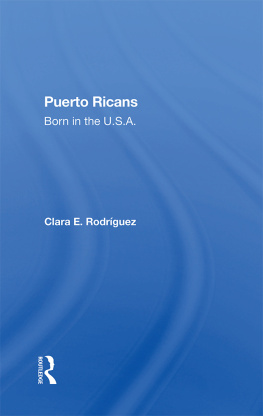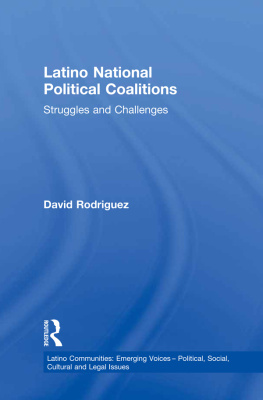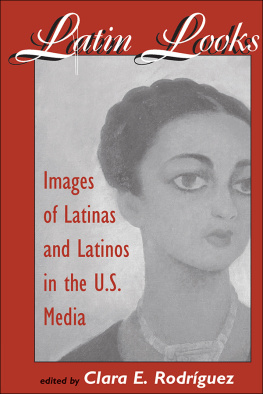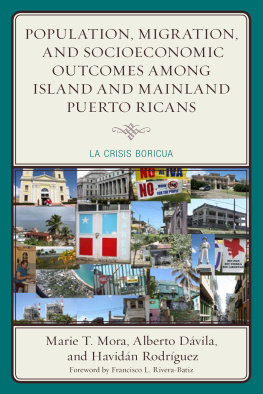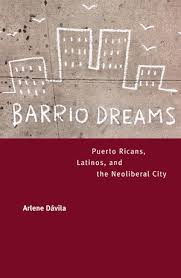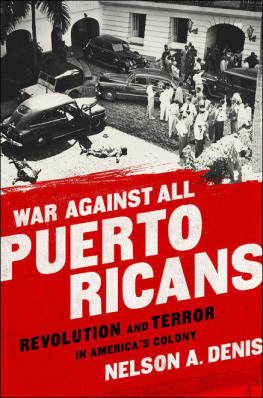First published 1991 by Westview Press, Inc.
Published 2019 by Routledge
52 Vanderbilt Avenue, New York, NY 10017
2 Park Square, Milton Park, Abingdon, Oxon OX14 4RN
Routledge is an imprint of the Taylor & Francis Group, an informa business
Copyright 1991 Taylor & Francis
All rights reserved. No part of this book may be reprinted or reproduced or utilised in any form or by any electronic, mechanical, or other means, now known or hereafter invented, including photocopying and recording, or in any information storage or retrieval system, without permission in writing from the publishers.
Notice:
Product or corporate names may be trademarks or registered trademarks, and are used only for identification and explanation without intent to infringe.
Library of Congress Cataloging-in-Publication Data
Rodrguez, Clara E.
Puerto Ricans: born in the U.S.A. / Clara E. Rodrguez
p. cm.
Bibliography: p.
Includes index.
ISBN 0-8133-1267-1 ISBN 0-8133-1268-X (pbk.)
1. Puerto RicansUnited StatesSocial conditions.
2. Puerto RicansUnited StatesEconomic conditions.
3. United StatesRace relations. I. Title.
E184.P85R59 1989
305.8'687295'073dc19
ISBN 13: 978-0-367-28485-5 (hbk)
In writing this book, I was constantly struck by how much Puerto Ricans seem to be at the center of the significant events of today. I was also struck by how little this is generally acknowledged. The South Bronx, which has the largest concentration of Puerto Ricans in New York, has been visited by a president, presidential candidates, the pope, actors, and foreign dignitaries, yet never once in the televised coverage of these visits did anyone comment upon the impact of the urban decay of the South Bronx on the Puerto Rican community. In the policy arena, Puerto Ricans are at the epicenter of battles over welfare reform, urban enterprise zones, and urban schools. Yet, to cite only the most recent example in the policy arena, Puerto Ricans in New York, "the poorest of American groups" in one of the richest states in the country, received only one line in the latest report of the Task Force on Poverty and Social Welfare (New York State, 1986).
Similarly, when the governor of New York, professors at Harvard, MIT, and Berkeley, and policymakers in Washington discuss deindustrialization, the new service economy, and the globalization of the economy, they usually ignore the fact that these trends affected Puerto Ricans more than most, and hit them sooner. When high-level policymakers and such mainstream media as the New York Times, the Los Angeles Times, and the Wall Street Journal do consider Puerto Ricans, they usually frame the discussion either in terms of the "plight" of Puerto Ricans, making it "their" problem, or in terms of the problem "they" present for "us."
On a global scale, Puerto Ricans also play critical yet unacknowledged roles. Puerto Ricans are at the center of U.S. efforts to "stabilize" the Caribbean. Puerto Rico is the anchor of the Caribbean Basin Initiative and the prime line of defense for the United States in Latin America. Yet the U.S. government has seldom acknowledged the strategic and crucial military and political importance of the island. Thus, despite being at the center of the issues discussed, the main actors are ignored. Puerto Ricans are effectively marginalized in the public view.
Today we are in an era of "renegotiated" social contractsbetween management and labor, between men and women, between members of majority and minority groups, and especially between government and the recipients of government funds. Surrounding these renegotiations are disturbing questions about why certain groups have not progressed in the American class structure, particularly at a time of relative economic growth. Some answers may be found in the nature of this new economic growth. For instance, much of the growth may be illusory; that is, many of the transactions associated with growth are purely financial, and may not contribute to real economic performance or significant job growth. It is also possible that the economic growth that has occurred has favored upper-level service professionals and low-skilled labor in the informal sector. Thus, those between these extremes, like most Puerto Ricans, may have benefited little. No matter what the explanation, the Puerto Rican experience has much to teach us about the political, economic, and cultural reasons certain groups remain so far removed from the American dream.
The Puerto Rican community must be understood in a broad historical and comparative framework. It is not enough to take a superficial view of the data, ask a few "captive" or well-chosen Puerto Ricans to assess the situation of Puerto Ricans, and consider this an adequate assessment of the condition of Puerto Ricans in the United States, as journalists often do. An appropriately broad, in-depth view must bear in mind that Puerto Ricans are both the only colonial group to arrive en masse and the first racially heterogeneous group to migrate to the United States on a large scale.
Organization of the Book
Contextual Analysis
This book examines the contexts into which Puerto Rican immigrants to the United States stepped, and the results of their interaction within those contexts. Essentially a social history of the post-World War II Puerto Rican community, the book focuses mainly on New York City, which has the largest concentration of Puerto Ricans in the United States. However, the issues addressed transcend the borders of New York.
The first chapter examines the migration of Puerto Ricans from a historical perspective. The second chapter examines the context in which the data for this study were gathered. Separate chapters then analyze race, education, housing, economic structure, and the media in terms of how they affect and are affected by the Puerto Rican community. This subject-area approach differs from the chronological approach generally used in the study of Puerto Ricans.
The subject areas addressed in this volume were chosen because they are important to a complete picture of the Puerto Rican experience in the United States. The historical context is presented so that the reader might better understand the factors leading to the migration of Puerto Ricans. The role of the political and economic relationship between Puerto Rico and the United States is seen to influence migration as well as Puerto Ricans' choice of communities in the United States. Puerto Ricans are then examined within the data contexta context that is often used by those attempting to explain the Puerto Rican experience. The data picture drawn by using standard statistical indicators is critically reviewed on a number of methodological bases, and common interpretations of the data are questioned.
takes an in-depth, multifaceted look at this issue.
The time of arrival is an important consideration in the insertion of any new group (Pedraza-Bailey, 1985; Bean and Tienda, 1988). Thus, the political-economic context is the focus of collar areas, and the relative exclusion of Puerto Ricans from government employment.
also details how, subsequently, new features of the economy further intensified a difficult economic situation. The features discussed include New York City's fiscal crisis; more austere federal policies; government's pulling out (in the 1980s) of training programs, affirmative action, and social spending; credentialism, plus the proliferation of more "credentialed" workers; labor competition as a result of the entrance of new immigrants working at lower wages; and diminishing middle-level jobs. It is argued that these factors have made up the troubled political and economic context into which Puerto Ricans stepped and within which they continue to live.


